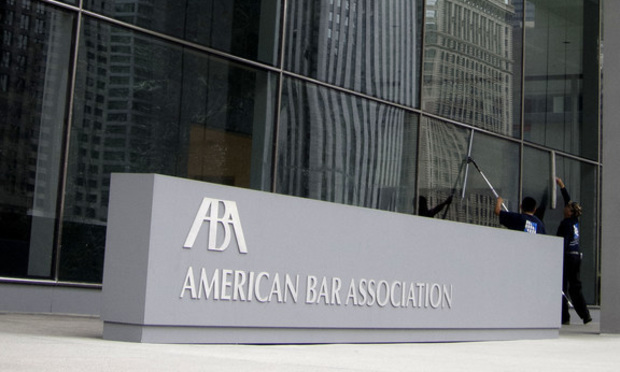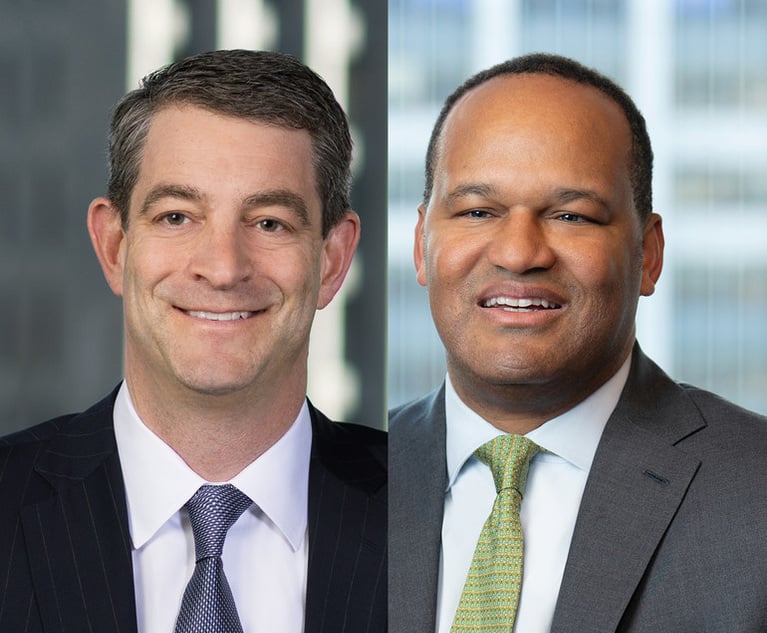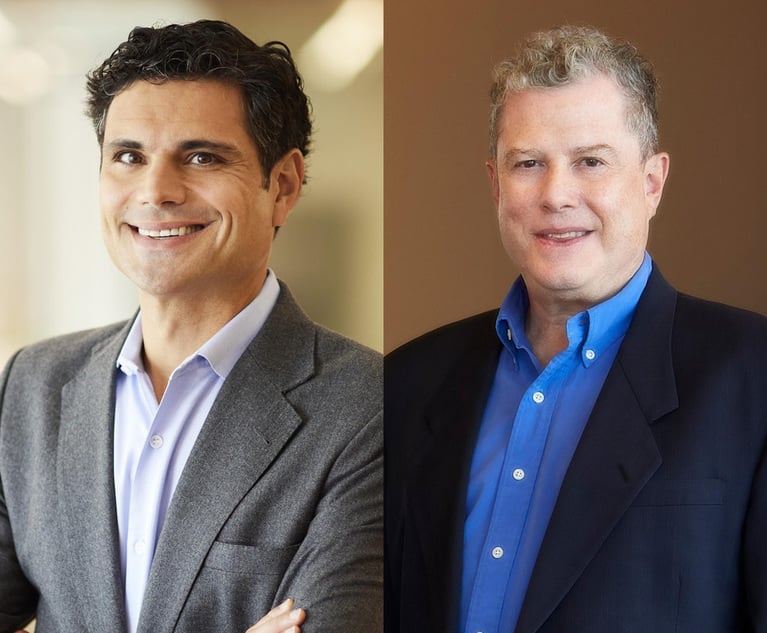ABA Could Encourage States to Allow Outside Ownership of Law Firms
The ABA's House of Delegates will consider a proposal on industry innovation at its February meeting. But some reformers say they question the group's appetite for change.
December 03, 2019 at 06:25 PM
6 minute read
 American Bar Association headquarters in Chicago. Photo: Diego M. Radzinschi/ALM
American Bar Association headquarters in Chicago. Photo: Diego M. Radzinschi/ALM
The American Bar Association is entering the burgeoning conversation over tearing down restrictions on outside ownership of law firms.
The ABA's Center for Innovation has released a resolution that, if adopted by the organization's House of Delegates, would encourage jurisdictions across the U.S. to experiment with new regulatory models aimed at increasing access to legal services.
Center for Innovation chairman Daniel Rodriguez, the Harold Washington professor at Northwestern University's Pritzker School of Law, said Tuesday that the group is agnostic about what form these experiments take.
"It's really an effort to encourage states to take a good hard look at their structure of legal regulation and legal service delivery, with an eye to access to justice," he explained. "That will give us the ability to look at the data and run what scientists call 'natural experiments.'"
Several states are ahead of the pack here. Bar groups and courts in California, Utah and Arizona have all launched proposals that take various paths toward allowing fee sharing with nonlawyers and permitting outside investment in law firms. The Chicago Bar Association has more recently formed its own task force to consider changes in Illinois.
While the Center for Innovation is neutral on the particular approaches states elect to employ, the ABA, through its Commission on the Future of Legal Services, has previously made clear that it supports efforts by state supreme courts to allow new models for legal service providers.
Rodriguez is hopeful that mandate, combined with his group's resolution, will spur more states to develop their own rules and structures. Ideally, this experimentation will lead to the identification of some best practices or common strategies that would inform the ABA in developing model rules.
"That's the dream," he said. "I'd like to see some convergence, speaking for myself, not the center, whether it's next year or three or five years from now."
But for the resolution to have any impact, it first must pass the ABA's House of Delegates, which will vote at the organization's midyear meeting in Austin, Texas, in February. It has already received support from four ABA standing committees that address professional responsibility, along with a number of state and local bar groups.
Jayne Reardon, the executive director of the Illinois Supreme Court Commission on Professionalism and a member of the Chicago Bar Association's recently launched task force on innovation, said that she is hopeful this support will make a difference.
"I do think that some of the members who make up the House of Delegates who may not be well versed in this issue may not be as supportive as others," she cautioned.
Joanna Mendoza, who sits on the California state bar committee tasked with increasing access to justice via innovation, said she would have appreciated an even bolder position from the ABA group, but she understands that tact would have been a nonstarter.
"There's a very vocal group of attorneys, as we've witnessed in responding to California's recommendations, who are very vocal against change," she said.
Nonetheless, she's hopeful that other states, and the California Supreme Court, which will need to approve any changes made by that task force, will take heed if it is approved.
"It will possibly help the court recognize there is a general movement in the country in this direction, perhaps making it more amenable to changes."
Reardon, meanwhile, is optimistic that if the resolution passes, it will move the needle in states that have been slow to reevaluate their regulatory structures.
"Some jurisdictions really look to the leadership of the ABA," she said, adding that the open-ended nature of the resolution will also make a difference.
"That is the only way to go at this point," she said. "I appreciate that the legal landscape and the political landscape in each of our jurisdictions is different. The ABA has not been very successful lately in promulgating model rules, particularly on a fairly tight timeline."
Indeed, the ABA has weighed amendments to its model rule 5.4, which bars fee sharing with nonlawyers, in the past, with no success. But the Center for Innovation resolution, after concluding that this prohibition impedes the development of new models for more efficiently delivering legal services, looks to overseas for support.
"The growing experience around the world with such arrangements—often called alternative business structures—suggests that there is a great deal to gain by experimentation in this area," the resolution says. It goes on to cite U.S. Supreme Court Justice Neal Gorsuch, who touched on the U.K.'s experience in his recent book, "A Republic If You Can Keep It."
"Six years into the experiment, the Solicitors Regulatory Authority analyzed ABSs and found that while these entities accounted for only 3% of all law firms, they had captured 20% of consumer and mental health work and nearly 33% of the personal injury market—suggesting that ABSs were indeed serving the needs of the poor and middle class, not just or even primarily the wealthy," Gorsuch wrote.
Holland & Hart partner Cory Talbot, who has been involved in Utah's reform efforts, believes this wider perspective makes sense.
"As more information comes from foreign jurisdictions about the work that's being done there and how it's been able to help with access-to-justice issues, I'm not surprised that people are saying we should take a second look at this," he said.
Reardon pointed to continuing inequalities in the U.S. as a call for action, noting that more than 80% of Americans below the poverty line and a majority of middle class don't have assistance when facing legal issues.
"In an increasingly complex world legally, to have this many people shut out of the system is an embarrassment," she said.
Read More
This Insider Says It's Time for Big Changes in California's Legal Industry
California Lawyers Slam Bar Proposals for Fee-Sharing, Nonattorney Ownership
This content has been archived. It is available through our partners, LexisNexis® and Bloomberg Law.
To view this content, please continue to their sites.
Not a Lexis Subscriber?
Subscribe Now
Not a Bloomberg Law Subscriber?
Subscribe Now
NOT FOR REPRINT
© 2025 ALM Global, LLC, All Rights Reserved. Request academic re-use from www.copyright.com. All other uses, submit a request to [email protected]. For more information visit Asset & Logo Licensing.
You Might Like
View All
'None of Us Like It': How Expedited Summer Associate Recruiting Affects Law Students and the Firms Hiring Them

Latham's Lateral Hiring Picks Up Steam, With Firm Adding Simpson Practice Head, Private Equity GC
3 minute read

Leaning Into ‘Core’ Strengths, Jenner’s Revenue Climbs 17%, Profits Soar 23%
4 minute readTrending Stories
- 1Thursday Newspaper
- 2Public Notices/Calendars
- 3Judicial Ethics Opinion 24-117
- 4Rejuvenation of a Sharp Employer Non-Compete Tool: Delaware Supreme Court Reinvigorates the Employee Choice Doctrine
- 5Mastering Litigation in New York’s Commercial Division Part V, Leave It to the Experts: Expert Discovery in the New York Commercial Division
Who Got The Work
J. Brugh Lower of Gibbons has entered an appearance for industrial equipment supplier Devco Corporation in a pending trademark infringement lawsuit. The suit, accusing the defendant of selling knock-off Graco products, was filed Dec. 18 in New Jersey District Court by Rivkin Radler on behalf of Graco Inc. and Graco Minnesota. The case, assigned to U.S. District Judge Zahid N. Quraishi, is 3:24-cv-11294, Graco Inc. et al v. Devco Corporation.
Who Got The Work
Rebecca Maller-Stein and Kent A. Yalowitz of Arnold & Porter Kaye Scholer have entered their appearances for Hanaco Venture Capital and its executives, Lior Prosor and David Frankel, in a pending securities lawsuit. The action, filed on Dec. 24 in New York Southern District Court by Zell, Aron & Co. on behalf of Goldeneye Advisors, accuses the defendants of negligently and fraudulently managing the plaintiff's $1 million investment. The case, assigned to U.S. District Judge Vernon S. Broderick, is 1:24-cv-09918, Goldeneye Advisors, LLC v. Hanaco Venture Capital, Ltd. et al.
Who Got The Work
Attorneys from A&O Shearman has stepped in as defense counsel for Toronto-Dominion Bank and other defendants in a pending securities class action. The suit, filed Dec. 11 in New York Southern District Court by Bleichmar Fonti & Auld, accuses the defendants of concealing the bank's 'pervasive' deficiencies in regards to its compliance with the Bank Secrecy Act and the quality of its anti-money laundering controls. The case, assigned to U.S. District Judge Arun Subramanian, is 1:24-cv-09445, Gonzalez v. The Toronto-Dominion Bank et al.
Who Got The Work
Crown Castle International, a Pennsylvania company providing shared communications infrastructure, has turned to Luke D. Wolf of Gordon Rees Scully Mansukhani to fend off a pending breach-of-contract lawsuit. The court action, filed Nov. 25 in Michigan Eastern District Court by Hooper Hathaway PC on behalf of The Town Residences LLC, accuses Crown Castle of failing to transfer approximately $30,000 in utility payments from T-Mobile in breach of a roof-top lease and assignment agreement. The case, assigned to U.S. District Judge Susan K. Declercq, is 2:24-cv-13131, The Town Residences LLC v. T-Mobile US, Inc. et al.
Who Got The Work
Wilfred P. Coronato and Daniel M. Schwartz of McCarter & English have stepped in as defense counsel to Electrolux Home Products Inc. in a pending product liability lawsuit. The court action, filed Nov. 26 in New York Eastern District Court by Poulos Lopiccolo PC and Nagel Rice LLP on behalf of David Stern, alleges that the defendant's refrigerators’ drawers and shelving repeatedly break and fall apart within months after purchase. The case, assigned to U.S. District Judge Joan M. Azrack, is 2:24-cv-08204, Stern v. Electrolux Home Products, Inc.
Featured Firms
Law Offices of Gary Martin Hays & Associates, P.C.
(470) 294-1674
Law Offices of Mark E. Salomone
(857) 444-6468
Smith & Hassler
(713) 739-1250










